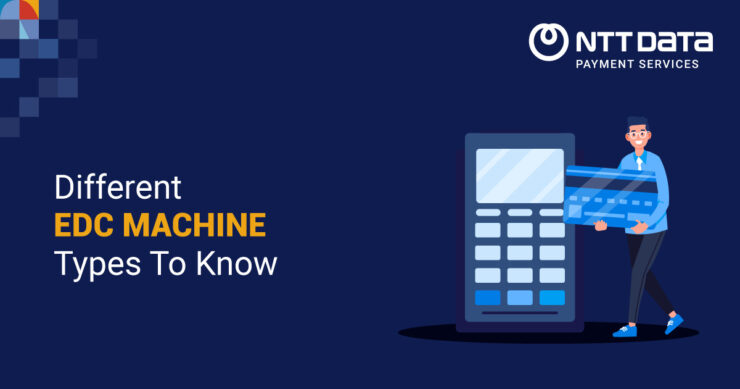
Table of Contents
- 1 Significance Of EDC And POS Machines
- 2 What Is An EDC Machine?
- 3 What Is A POS Machine?
- 4 Top 7 Differences Between EDC vs POS Machines
- 5 Access Online Payments With NTT DATA Payment Services India
- 6 Conclusion
- 7 FAQ
- 8 Different EDC Machine Types to know
- 9 Advantages of a Mobile Point of Sale System (mPOS)
Significance Of EDC And POS Machines
EDC vs POS Machines With the rapid growth of digital payments and e-commerce, EDC and POS machines have become essential tools for merchants to accept both cash and digital payments from customers. They allow merchants to complete transactions quickly and securely while providing customers with flexibility in how they pay.
Whether a small retailer or large enterprise, having the right payment acceptance solution like EDC or POS machines is important for business growth and customer satisfaction.
What Is An EDC Machine?
An EDC machine, sometimes also called a payment terminal, is a device that allows merchants to securely swipe or insert credit/debit cards to process payments electronically. EDC stands for “Electronic Data Capture”, as it captures and transmits card data electronically for authorisation and settlement.
EDC machines are compact, portable devices that can be easily carried around by mobile merchants like delivery personnel to process payments on the go. They have built-in card readers to read magnetic stripe or chip cards.
Basic EDC machines only support card-not-present payments and do not have additional features like an integrated printer, customer display, etc.
What Is A POS Machine?
A POS or Point of Sale machine is more full-featured than an EDC terminal. In addition to card payments, a POS machine supports other functionalities required at a physical retail store counter. POS stands for “Point of Sale” as it manages the sale transaction at the point where payment is exchanged.
Key features of a POS machine include an integrated card reader, cash drawer, customer-facing display, receipt printer and sometimes barcode scanner. POS software runs on the machine to manage inventory, process returns, issue invoices, etc.
POS machines support both card-present and card-not-present transactions. Larger POS systems can be network-connected for centralised reporting.
Top 7 Differences Between EDC vs POS Machines
Here are 7 major differences between EDC vs POS machines.
| Factors | EDC Machine | POS Machine |
| Mobility | Portable and compact – can be carried around | Stationary devices are installed at a fixed location like a retail counter. There is also a mobile version of POS. |
| Functions | Only accepts payments – no additional features | Combines payment processing with inventory management, basic accounting, etc. |
| Connectivity | Connects via Bluetooth/USB to a smartphone/tablet | Requires a dedicated internet connection – can be wired or wireless |
| Software | No dedicated software – works with basic payment apps. | Runs on specialised POS software for various business functions. Provides support for various OS devices. |
| Cost | More affordable. Businesses on a tight budget can go for an EDC machine | Higher initial investment. It might include subscription-based costs for cloud features and support. |
| Data Security | Highly secured – bank grade | Highly secure – PCI compliant |
| Processing | Comparatively faster processing and is best suited for high-volume transactions. | Comparatively less fast with payment transactions. |
While both EDC vs POS help businesses accept digital payments, EDC is best for portable card acceptance solutions and POS for integrated retail management at a physical storefront.
Access Online Payments With NTT DATA Payment Services India
Businesses can enable both online and in-store payments by partnering with a payment provider like NTT DATA Payment Services India.
NTT DATA Payment Services India offers a complete payment solution to advance both your offline and online businesses. From online payment gateway and POS machines to IVR payments and Bharat QR Scan and Pay, we ensure maximum comfort, convenience, and safety for all your payments.
Conclusion
Understanding the differences between portable EDC terminals and integrated POS systems can help merchants choose the right solution based on their business model and customer interaction points. Partnering with a leading payment provider unlocks the ability to accept in-store and online payments through a single integration.
FAQ
1. What is an EDC machine used for?
An EDC machine or payment terminal securely processes card payments electronically. It allows merchants to swipe or insert credit/debit cards and capture payment details for authorisation and settlement. EDC machines are portable devices that mobile merchants can carry around.
2. Is an EDC machine or POS machine better for a small business?
A small business on a tight budget can opt for an affordable EDC machine for basic card acceptance needs. A POS machine has additional features but higher costs. Based on payment volume and needs, EDC may suffice initially, while a business can upgrade to POS later as it grows.
3. Can EDC and POS machines accept both cash and card payments?
While EDC and POS machines can accept card payments electronically, only POS machines support integrated cash management features like a cash drawer. EDC terminals are for card acceptance only via their integrated card reader.
4. Is there a difference in processing speed between EDC and POS?
Generally, EDC machines provide faster transaction processing speeds that are suitable for high-volume scenarios compared to POS systems, which may have slower speeds due to additional integrated features for retail management.
5. What is the cost difference between EDC and POS?
On average, EDC machines have lower upfront device costs than POS systems. However, POS solutions have additional subscription and maintenance expenses over the long run.


